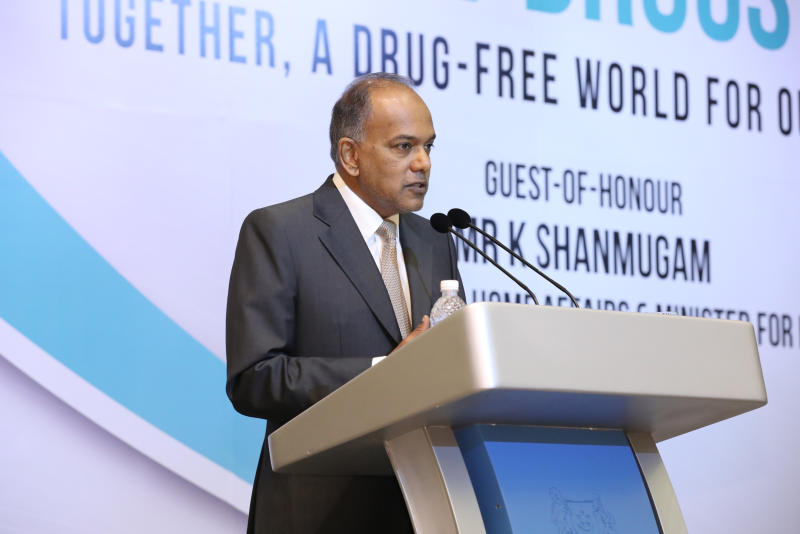Six abolitionist groups respond to Minister K. Shanmugam's comments on death penalty
Sign up now: Get ST's newsletters delivered to your inbox

Home Affairs and Law Minister K. Shanmugam giving his opening address at the second Asia-Pacific Forum Against Drugs at the ParkRoyal hotel in Beach Road on Oct 26, 2017.
PHOTO: CENTRAL NARCOTICS BUREAU
SINGAPORE - Six abolitionist groups, who have spoken up against the death penalty in Singapore, have jointly responded to comments made by Home Affairs and Law Minister K. Shanmugam at last week's Asia Pacific Forum Against Drugs.
The statement, which was posted on Facebook on Monday (Oct 30), said that Mr Shanmugam had made "misleading claims" about abolitionists at the forum on Oct 26.
This includes the suggestion that the groups are calling for the legalisation of drugs.
"There is a range of opinions and perspectives on the issue of drug policy among members of the abolitionist campaign," said the statement.
However, the groups agree that the problem of drugs, which is on the rise, "is of concern and should be addressed in holistic ways".
Thus, they have called on the Government to make all data related to the use of the death penalty - as well as studies and evidence behind the minister's claims - accessible to the public.
Among the claims highlighted include the minister's comment that the death penalty "substatiantially reduces the number of people who seek to traffic drugs into Singapore," the statement said.
It was signed and endorsed by Community Action Network, Function 8, Maruah, Singapore Anti-Death Penalty Campaign, Think Centre and We Believe in Second Chances.
The groups also took issue with what it called a "mischaracterisation" of drug trafficking offenders who are facing the death row.
They said that Mr Shamugam had made references to "romanticising individuals who have been involved in the drug trade" and telling "romantic stories" about those convicted of drug trafficking.
"The stories of death row inmates and their families are important because these experiences are also part of the death penalty and its application in Singapore, and should not be erased from ongoing conversations about capital punishment in our country", the statement said.
In his speech, Mr Shanmugam had said that the death penalty is not the solution that solves all problems, but part of a larger framework that includes reducing the drug supply and rehabilitating offenders,
"The stakes are made very clear upfront and that, I think, has a very powerful influence on those who seek to traffic drugs into Singapore," he had said.
Singapore does not take any joy and comfort in having the death penalty, he said, adding that it "saves more lives", including those of families ruined by drug addiction.
He also said there is an "undoubted number of deaths that will occur if you take a more liberal approach towards drugs", with a rise in homicides and other crimes leading to death not being theoretical arguments.


